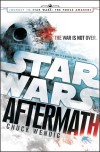SPOILER ALERT!
Down the Mysterly River
 When I first read Watchmen, I was blown away with how Alan Moore deconstructed the whole idea of the superhero and told a gritty, realistic tale of how folks with superhero powers are really just humans become gods, and how they deal with their vast powers. It was groundbreaking and felt significant, and I became an Alan Moore fanboy at that moment. And as I gradually started reading more and more of his stuff, I realized that he did this same sort of thing quite a bit. Miracleman? Yep. Swamp Thing? Also yep. It’s not a bad thing (both of those series are still impressive, nearly 30 years later), but the repetition felt slightly disappointing.
When I first read Watchmen, I was blown away with how Alan Moore deconstructed the whole idea of the superhero and told a gritty, realistic tale of how folks with superhero powers are really just humans become gods, and how they deal with their vast powers. It was groundbreaking and felt significant, and I became an Alan Moore fanboy at that moment. And as I gradually started reading more and more of his stuff, I realized that he did this same sort of thing quite a bit. Miracleman? Yep. Swamp Thing? Also yep. It’s not a bad thing (both of those series are still impressive, nearly 30 years later), but the repetition felt slightly disappointing.I bring that up because the same principle applies to Bill Willingham. In some ways, it makes sense — Fables, Jack of Fables, and Peter and Max are all set in the same universe — and besides, there’s not a whole lot outside of that universe that I’ve read by him. Down the Mysterly River might be an extension of that theme, but it’s not explicitly in the same universe. The characters in the novel are literally that, characters from other books who converge on this mysterious world and try to figure out how they got there while avoiding the vicious Blue Cutters who are after them for reasons unknown. The thing is, they don’t realize they’re characters from someone else’s books, and besides, once they set foot in this world, they’re no longer characters, they’re real. So it’s easy to see how the book can fit into the world of Fables, and might explain how this book got republished.
Republished, you ask? Yep. The book wasn’t promoted as a reprint, but this is actually an older work of Willingham’s from 1990. I think the publishers were hoping to ride the wave of popularity that the author’s enjoying, especially considering how easily the book fits in with the rest of his oeuvre. It smacks of being a money-grab, which always bugs me, but what bugs me even more is that this is a pretty decent read by itself, and deserves the reprint, despite the similarities it has to his existing work. At the very least, I’m glad that it didn’t get retconned to fit into that universe.
The main characters of the story are all characters from other books, and since I haven’t read those works, I don’t know how well Willingham captured those characters. What I do know is that it was very easy to relate to all of them, and that they all had distinctive personalities that worked well together. It was easy to sympathize with and care for them and feel what they were feeling. The story is compelling and interesting, and well worth reading. I think this is being marketed as a juvenile novel, but I can see it working well for anyone who enjoys Willngham’s other works.






